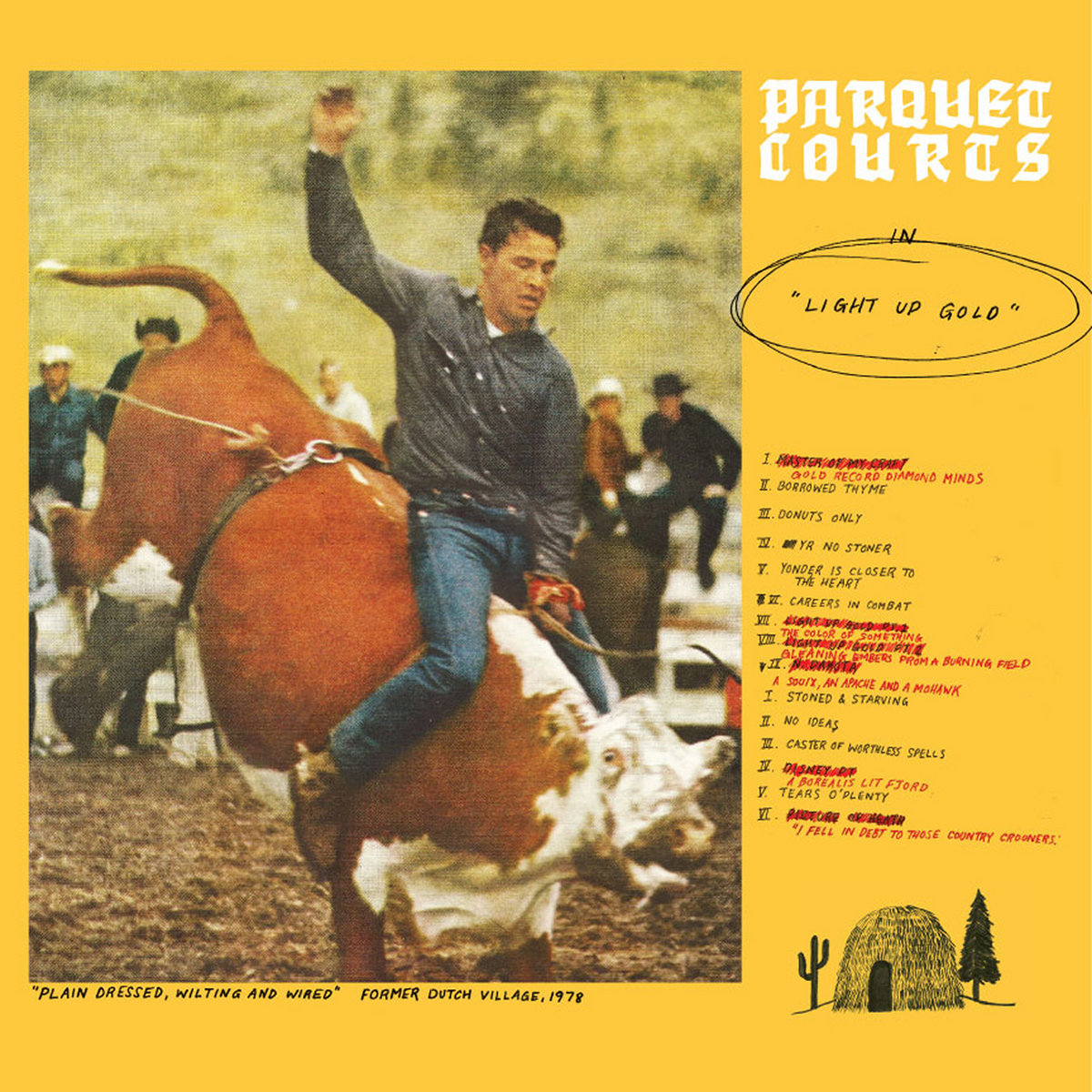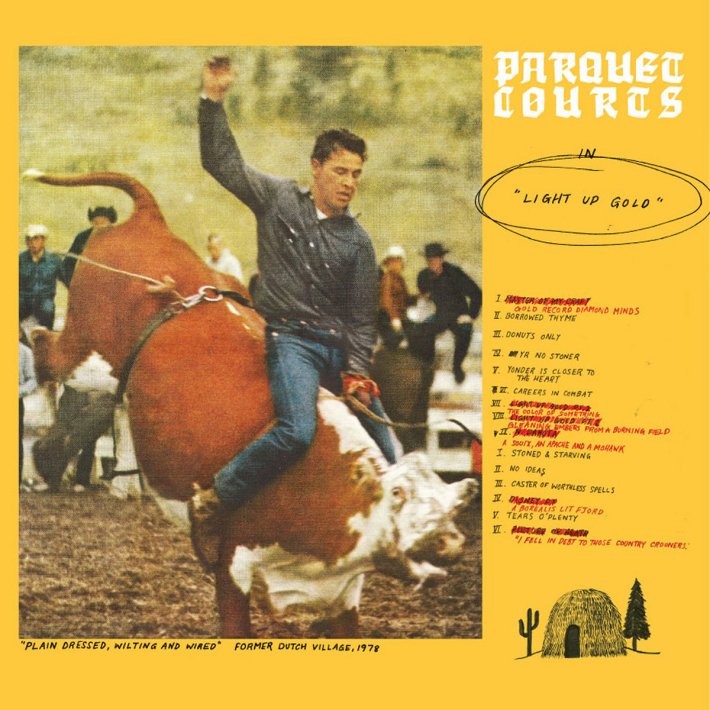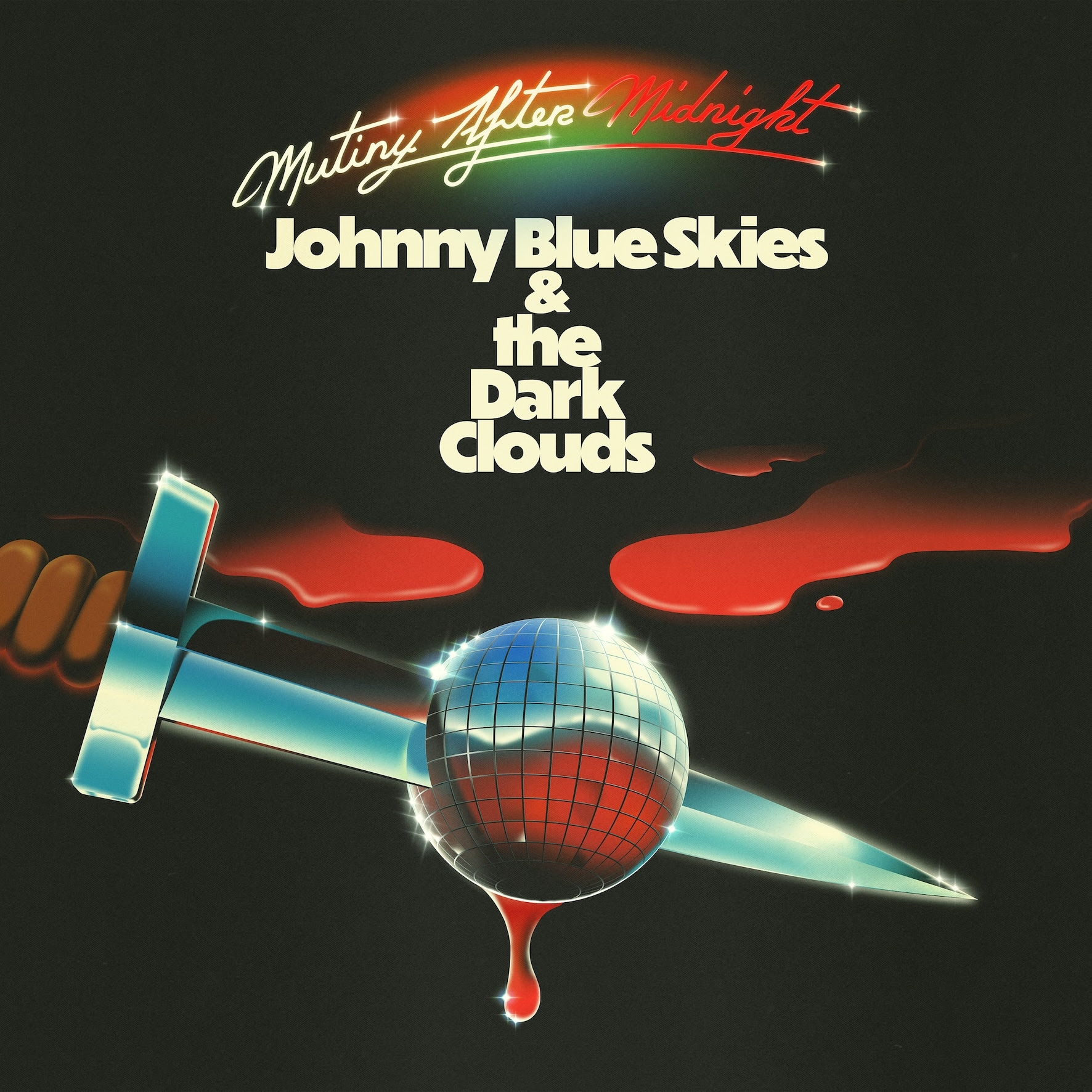- Dull Tools/What's Your Rupture?
- 2012
Parquet Courts are one of the great rock bands of their generation. You know this, I know this, but perhaps some other people don't know this because Parquet Courts have also hit that Spoon-esque point of being so exceptionally good, so consistently, for so long. To be exact: The band celebrated their 10th anniversary in 2020, and their debut American Specialties turned 10 last year. But now we've hit the real genesis point, when Parquet Courts had their breakthrough and became a going concern on the strength of their sophomore album. After Light Up Gold arrived — 10 years ago today — Parquet Courts soon proved they were one of the best, most vital, and perennially interesting indie bands around. In turn, Light Up Gold was one of the most enduring collections the genre yielded in the last decade.
By the time Parquet Courts got to Light Up Gold, there was already some history. The group's dual frontmen Andrew Savage and Austin Brown had met back in Texas during college; both had other musical projects along the way. Eventually they, along with Savage's younger brother Max, had all relocated to New York City, where they linked up with bassist Sean Yeaton. In those early days, Brown and Savage would hit DIY venues and start to mingle with the scene around Brooklyn. There were a lot of cool bands. They thought about having a cool band, too.
Parquet Courts cut their teeth playing those same DIY stages and released American Specialties on Savage's Dull Tools label. (Light Up Gold was also originally released on Dull Tools in August of 2012, but was reissued by What's Your Rupture? in early 2013, so the buzz surrounding it grew steadily and gradually over half a year.) By the time they got to Light Up Gold, they were kicking off an album with a song called "Master Of My Craft." Despite all the layered humor and detached affectations that would flit in and out of view across the album — "Master Of My Craft," with its "Socrates died in the fucking gutter" and all, was more tongue-in-cheek than self-aggrandizing — the song's title rang true. Parquet Courts weren't novices, but they were still a new band to most listeners. And in that context, Light Up Gold was a lightning strike: an introduction to a band that already sounded like they knew exactly what they were doing, who had a lot of ideas and just as many hooks with which to carry them.
Light Up Gold’s 15 tracks clock in at just over 30 minutes, but it feels twice as long. Not because it drags in any way — quite the opposite. The album is an almost dizzying nonstop array of infectious melodies, tangled guitar riffs, and brainy one-liners. It's a furious, quick listen with so many songs cramming everything in under two minutes that it sometimes felt like a single extended work flipping from one movement to the next. It rearranged your relationship to your surroundings while it was on, which is really to say it offered its own world.
Light Up Gold came out my senior year of college, and I played it to what should've been death. It's one of those albums where you have a favorite on first listen, and then something like 80% of the other songs will be your favorite on one listen or another. In its range-y restlessness, it was also bulletproof indie rock that smartly cribbed from all the right corners of history. The Pavement comparisons were inevitable and persistent, alongside the references to post-punk — neither incorrect, but both reductive in terms of the album's scope, let alone where the band would go from here.
If you were even the slightest bit amenable to this type of stuff, "Master Of My Craft" and "Borrowed Time" and "Donuts Only" — an almost unholy opening trio in terms of "take no prisoners" effectiveness — were the kind of songs you wanted injected directly into your veins. All these years later, I still get them stuck in my head all the time, at random, even when I haven't listened to or thought about Parquet Courts in a bit. Ditto "Light Up Gold II" and "N Dakota." It doesn't feel brand new today: Parquet Courts' brand of "post-punk" predates a whole era of revivalism that makes them sound very much of a preceding chapter, and the rawness of the album marks it as a more youthful document compared to their subsequent albums. Yet at the same time, all these songs are still so catchy. Ten years has done nothing to diminish any of their charms, and, for me at least, they're as welcome in my head as they were back in 2012.
Then there's "Stoned And Starving." In the context of Light Up Gold, this was the towering five-minute epic, an obvious highlight everyone pointed out. There was good reason for that. "Stoned And Starving" is one of those chills-inducing songs, where, the first time you hear it, you recognize it has its own kind of perfection. The way the groove propels patiently, intensifying almost imperceptibly, an inevitable motorik forward motion soundtracking a tale of aimless wandering around the streets of New York. The guitars, scraggly along the way and then gracefully fading out into humid feedback by the end. The way "I was walking through Ridgewood, Queens" immediately hits like an iconic opening line. Personally, I was walking around Greenwich Village, neither nor stoned nor starving. But I can still remember the 20-something listlessness viscerally captured in that song, how close it hit to home. At the same time, they seemed to, even with several years in New York already behind me, suggest that imagined, fictional city I'd heard in the songs of so many of their predecessors.
Parquet Courts famously abandoned the song for years, only recently welcoming it back into their sets — an aversion one might perceive as willfully difficult, because "Stoned And Starving" was obviously their most popular song for a very long time. There was a certain narrative that developed around them after Light Up Gold: a new generation of slacker rock, the stoner dudes with all these zany references. When I interviewed the band ahead of Light Up Gold’s 2014 successor Sunbathing Animal, they seemed like they were very much trying to rearrange the perception of Parquet Courts as it existed to that point. Since then, they've outgrown whatever first impressions people had in 2012/2013. As each album grappled with life in contemporary society, all those stoner/slacker moments glimpsed on Light Up Gold began to feel like one scene in a larger story of young people entering adulthood in tenuous times, constantly wrestling with how in the hell to navigate all of this. Even if they still haven't unraveled all that, it's nice to see them recognize "Stoned And Starving" as part of the story again. The song is a modern classic.
There was one thing that did hang around from that song. One little reference to Ridgewood, Queens — a place that borders Brooklyn's Bushwick, but sounded deeply foreign within 2012's much earlier waves of gentrification — would lead to many more New York themes across the band's career. Despite their Texan roots, Parquet Courts were a band founded in New York, a mantle they did seem to enjoy carrying. This was another inevitable comparison point when Light Up Gold was popping off, the endless refrain of "It's been a while since we've had a band like this come out of New York," etc. At the time, a young band could've been squashed under the weight of that city's mythologized history. Instead, from "Stoned And Starving" all the way to "Walking At A Downtown Pace," the opener of last year's Sympathy For Life, Parquet Courts staked their claim to that territory. Speaking as someone who's lived in New York for the band's entire existence, they've made some of the best rock music coming out of here, and inspired by here, during their time.
At this point, thinking about Parquet Courts simply in the lineage of New York bands almost feels diminishing. If you see some of the bands name-checked alongside them in those early reviews you'll notice that nobody else has really gone the distance. Ten years after Light Up Gold, Parquet Courts have gotten to that point where you associate them with larger swathes of music history, because they're the one name that made it, that proved themselves and lingered, from whatever microcosm they originated in. Parquet Courts have written more sophisticated albums since, while there may also be fans who still hold Light Up Gold above anything that came after. Wherever you land on their career, Light Up Gold is undeniably the work of a younger, scrappier band. That isn't a qualitative statement — it's also the sound of a hungry new group kicking down the door and demanding to be heard. With a decade of hindsight, it feels like an exhilarating prologue for a band that would soon reach a lot more ears without wavering from their ethos, their sense of adventurousness, or their insistence that along all the sly asides and strangled riffs, this stuff could make you think, too. They were just getting started.
We rely on reader subscriptions to deliver articles like the one you're reading. Become a member and help support independent media!







